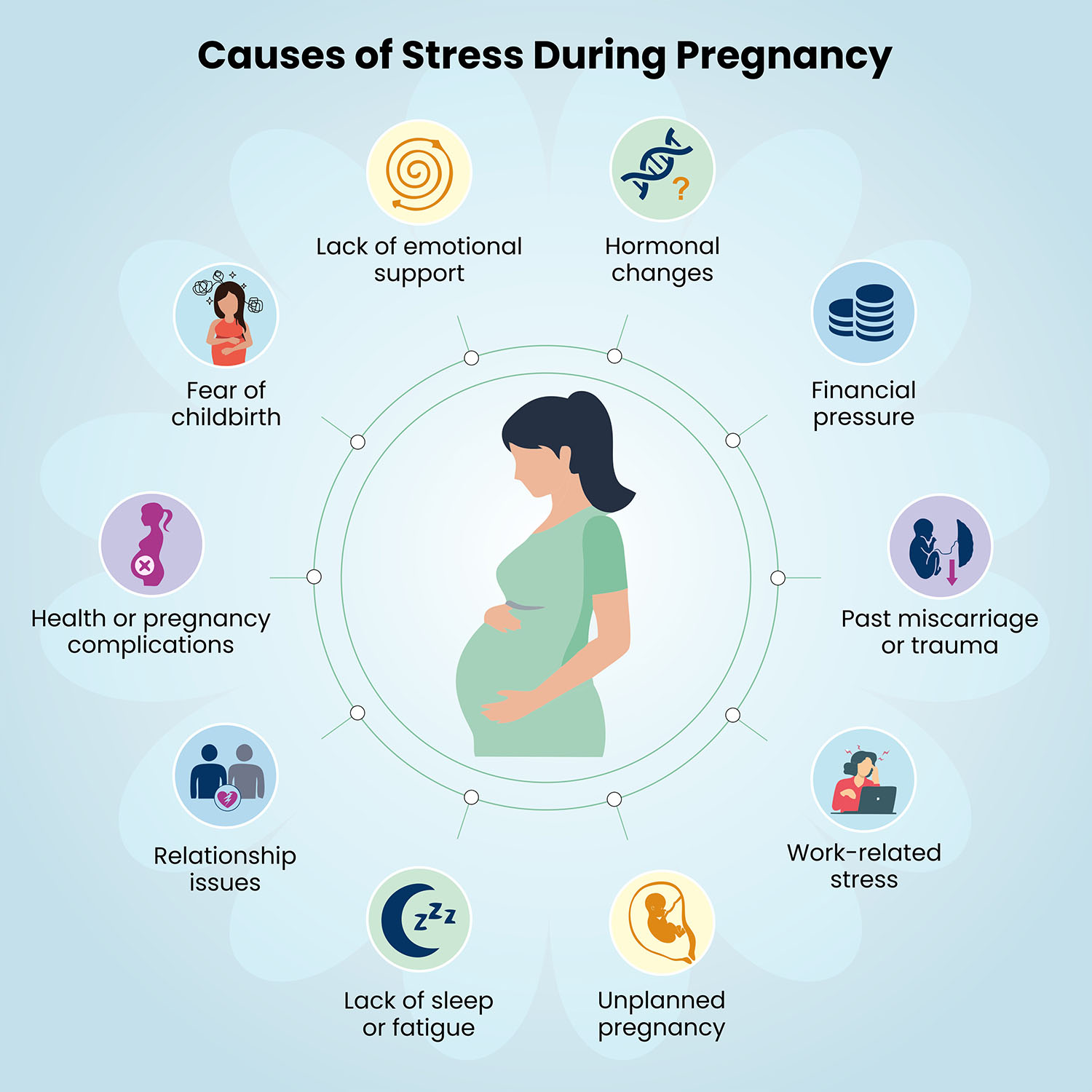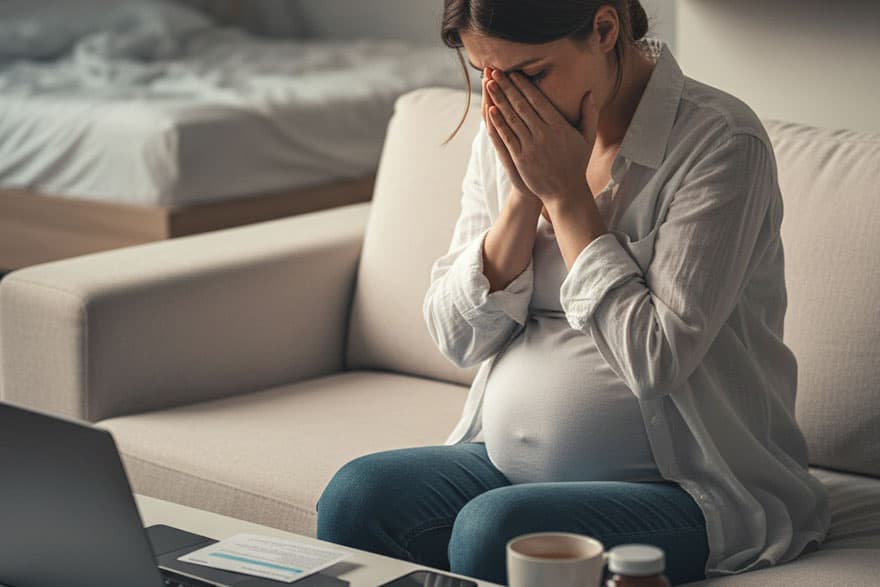Pregnancy is meant to be a wonderful experience when stress does not become an unwanted visitor. Studies show that more than 70% of mothers experience considerable stress during pregnancy, which can jeopardize the health of both mother and child.
Chronic stress experienced during pregnancy can increase the chance of premature birth, low birth weight, and delays in development in the infant. High levels of cortisol - the body's main stress hormone - can also have adverse effects on the health of both the infant's brain and emotions.
The research illustrates how stress has harmful effects during pregnancy, which can positively change the experience for the mother and child to be a healthy, enjoyable, balanced, and safe experience.
What Causes Stress During Pregnancy?
Every mom-to-be has her own reasons to be stressed during pregnancy. However, some common causes include—
- Being scared about the labor pain and delivery,
- Worrying too much about losing the baby,
- Fear of responsibility to take care of the baby,
- Insomnia during pregnancy can lead to various unnecessary and stressful thoughts
- Feeling stressed about the finances required to raise a child and
- Dealing with uncomfortable physical changes like nausea and tiredness.
And, of course, sometimes there's the added frustration of stressing about feeling stressed.
Types of Stress that Harms the Baby
The following are a few things that majorly affect the growth and development of your baby—
- Extreme life changes— going through a divorce or losing someone close
- Financial or health problems,
- Faced natural calamities,
- Facing racism, and
- Constantly stressing about pregnancy.
In such cases, talk to your doctor or a therapist for help and support.

Symptoms that You’re Stressed
Whether you're pregnant or not, when your body is stressed, it goes through various physical and chemical changes. Here are some common signs of stress during pregnancy:
- Your heart rate increases.
- Grinding your teeth.
- Headaches.
- Back pain.
- Upset stomach.
- Feeling tired.
- Trouble concentrating.
- Difficulty sleeping.
- Changes in eating habits.
- Feeling frustrated, worried, sad, or angry.
- Wanting to be around people all the time or feeling scared to be alone.
Can Stress During Pregnancy Affect My Baby’s Development?
Everyday stress during pregnancy, like worrying about work or household things, generally doesn’t harm your baby. However, severe ongoing stress where you keep on thinking too much about certain stressful situations might, in some cases, raise the chances of—
- Preterm labor/Premature birth
- Miscarriage
- Having a baby with a low birth weight
- Slower development in the baby’s growth
Remember, babies that are born too early or with a lower birth weight might face more issues than babies born out of a healthy pregnancy.
Effects of Stress On Pregnancy
Stress during pregnancy not only impacts your mood but also directly affects your physical health and the development of your baby. A pregnant woman under chronic stress will have chronically high levels of the stress hormones cortisol and adrenaline that can interfere with normal fetal development and her health.
Key effects of stress during pregnancy include:
Premature Labor: Stress can lead to early labor that results in early delivery.
Low Birth Weight: Chronic stress may limit blood flow to the placenta, which can limit oxygen and nutrients for the baby.
High Blood Pressure (Preeclampsia): Chronic stress can create elevated blood pressure that can lead to additional health risks for the mother and child.
Decreased Immune System Functioning: The mother is more prone to infection due to stress that may contribute to the health effects for the fetus.
Emotional and Behavioral Concerns in the Infant: Research suggests that exposure to high levels of maternal stress may cause an infant to show anxiety or hyperactive behavior in the future.
Postpartum Depression: Uncontrolled stress experienced during pregnancy may lead to depression after childbirth.
In summary, stress impacts pregnancy both physically and emotionally, so managing stress is vital for a healthy pregnancy and baby.
How to Prevent Stress During Pregnancy
- Try talking to people you trust about your stress, be it your partner, friend, doctor, or therapist. Do not hesitate to ask for help.
- Indulge yourself in different tasks like preparing your baby’s nursery, or you can even shop for your baby onboard.
- Engage in mild exercises, workouts, or activities like meditation, prenatal yoga, and deep breathing to calm yourself down.
- Taking breaks and listening to music might help.
- Allow yourself to express your feelings and release emotions. Also, cry it out if needed.
- Follow a healthy diet. Be mindful of what you eat— avoid excess sugar, and stay hydrated. Consuming water can also help you sleep better.
- Enjoy self-care activities like a warm bath or a prenatal massage.
- Ensure you get enough rest. Professionals recommend finding the right pregnancy pillow for better comfort and support.
Stressing Too Much, Call for Help Right Away!
If you really feel stressed or anxious and notice that your stressful thoughts aren’t going away, tell your doctor immediately. Do not forget to inform your doctor if you are dealing with insomnia or loss of appetite.
Remember, it's okay to feel stressed, but it is important to seek help when required and take care of yourself. It is not only good for you in general, but also for your baby growing inside you.
Final Thoughts
It is completely normal to feel stressed when pregnant. Also, everyday stress is usually not harmful to you or your baby. However, be careful not to overthink, as it can affect your health, leading to preterm labor and also impacting the baby's overall development.
However, the good news is that there are lots of ways to manage stress during pregnancy. Practicing stress management in your life can make things a lot easier and keep you and your baby healthier.






















